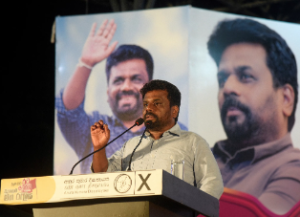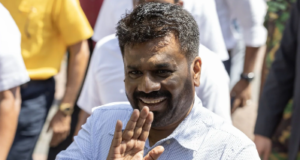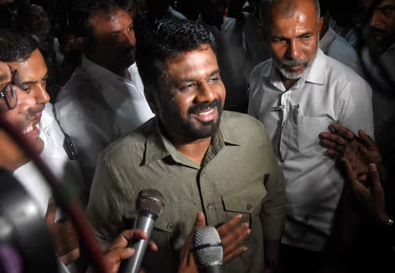COLOMBO, Sri Lanka — Anura Kumara Dissanayake, the leader of the National People’s Power (NPP) party, has been sworn in as Sri Lanka’s new president, promising to “rewrite history” as the country strives to recover from its deepest economic crisis in decades. Dissanayake’s left-leaning agenda and anti-corruption stance have positioned him as a disruptor of the political status quo, ushering in a new era of governance.
Breaking the Mold: A Political Shift in Sri Lanka
Dissanayake’s victory marks a seismic shift in Sri Lankan politics. For the first time since 1982, the presidential race extended into a second round of counting, highlighting the public’s demand for change. He secured 5,740,179 votes, surpassing opposition leader Sajith Premadasa, who garnered 4,530,902 votes. The election was widely seen as a repudiation of the entrenched political elite, notorious for corruption and cronyism.
“This victory belongs to all of us,” Dissanayake declared in a statement on the eve of his inauguration. “Together, we stand ready to rewrite Sri Lankan history.”
Addressing Economic Crisis: Promises of Reform and Growth
Sri Lanka is still grappling with the aftermath of a catastrophic economic collapse that led to massive protests and the ousting of former President Gotabaya Rajapaksa in 2022. Dissanayake has vowed to tackle the economic crisis head-on, pledging robust reforms to stimulate growth in manufacturing, agriculture, and the IT sector. He has also committed to continuing the International Monetary Fund (IMF) bailout deal while mitigating the impact of austerity measures on the country’s most vulnerable populations.
“The most serious challenge is how to restore this economy,” said Dr. Athulasiri Samarakoon, a political scientist at the Open University of Sri Lanka.
Dissanayake faces the daunting task of managing Sri Lanka’s $83 billion public debt, of which $36 billion is foreign debt, with China as the largest bilateral creditor. His strategy for debt restructuring and securing additional funding channels will be crucial in stabilizing the economy and restoring investor confidence.
Political Upheaval: Parliament Dissolution on the Horizon?
Prime Minister Dinesh Gunawardena resigned ahead of Dissanayake’s inauguration, signaling potential political upheaval. Dissanayake has hinted at dissolving parliament, aligning it with the will of the people.
“There is no point continuing with a parliament that is not in line with what the people want,” he said in a previous interview with BBC Sinhala.
This potential dissolution could pave the way for a parliamentary election, allowing Dissanayake to consolidate his power and implement his ambitious reform agenda.

International Support and Strategic Alliances
Global leaders, including Indian Prime Minister Narendra Modi and Pakistani Prime Minister Shehbaz Sharif, have congratulated Dissanayake on his victory. The new president’s ability to balance relations with key international stakeholders, particularly China, will be vital as Sri Lanka navigates its complex debt restructuring process.
The IMF’s $2.9 billion bailout, secured by outgoing President Ranil Wickremesinghe, remains critical for economic recovery but comes with stringent economic and governance policy reforms. Dissanayake has pledged to adhere to these conditions while advocating for measures that protect the nation’s poorest citizens.
A Fresh Start for Sri Lanka: Public Hope and Expectation
Dissanayake’s rise to power reflects a broader yearning for change in a country that has suffered from decades of political corruption and economic mismanagement. His leadership will be tested as he strives to implement a transformative agenda aimed at reviving the economy, combating corruption, and restoring public trust in the government.
“The millions of eyes filled with hope and expectation push us forward,” Dissanayake said. “We stand ready to reshape the future of Sri Lanka.”
As Sri Lanka embarks on this new chapter, the world watches closely, hoping that Dissanayake’s presidency will deliver on its promises and lead the nation toward stability and prosperity.
Sri Lanka’s newly elected president, Anura Kumara Dissanayake, represents a major political shift in the country, which is still grappling with economic fallout from its 2022 crisis. Dissanayake, leader of the left-leaning National People’s Power (NPP) party, campaigned on an anti-corruption platform and promises of reform aimed at breaking away from the traditional political elite.
His victory is seen as a rejection of the established political order, which has been plagued by allegations of corruption and mismanagement. Dissanayake secured approximately 42% of the vote, defeating opposition leader Sajith Premadasa and outgoing President Ranil Wickremesinghe. His win is significant not only because it marks a departure from previous leadership but also because it reflects the growing demand for systemic change among the populace, particularly younger voters.
Dissanayake’s campaign focused on economic recovery, promising to renegotiate the terms of Sri Lanka’s bailout agreement with the International Monetary Fund (IMF) to make it less burdensome for the poor. He also pledged to cut taxes and expand welfare programs, positioning himself as a champion of the working class. However, he faces substantial challenges ahead, including managing the country’s debt, addressing high living costs, and ensuring social stability amidst ongoing economic hardship.
His election comes at a critical juncture, as Sri Lanka struggles with severe shortages of essentials like fuel and medicine and works to restore its foreign exchange reserves. The country’s economic crisis has been exacerbated by the Covid-19 pandemic, poor policy decisions, and under-taxation, all of which led to its declaration of bankruptcy in April 2022.
Dissanayake’s background in the Marxist Janatha Vimukthi Peramuna (JVP), known for its violent past, adds a layer of complexity to his presidency. He has, however, sought to distance himself from this past by advocating for more moderate policies and broader alliances. His government is expected to focus on economic recovery, anti-corruption measures, and restructuring the parliament to better align with public expectations.






